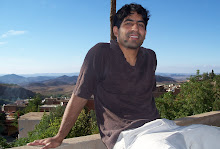Now, just recently, I had the fortune of eating an absolutely marvelous Moroccan dish called bastilla. Before I was to set foot in Morocco, I had written down a list of must-eat Moroccan dishes and bastilla was in my top 5--yes, I had well over 10 things that I had to devour before leaving. I arrived in Meknes after a short stay in Chefchaouen and on December 31st before the end of 2011, I saw, met, and most definitely enjoyed a moment of transcendence as I slowly crunched and gave every bite of the long-awaited bastilla the 40 thorough chews that it deserved. It's a perfect combination of sweet and salty, moist and well-seasoned chicken with sweet and crunchy almonds, with other complementary spices giving it even more flavor, and finally wrapped in a thin crispy exterior.
 |
| Moroccan Bastilla |
The pie is surrounded by a very thin pastry leaf called warqa (which means "leaf"[also paper]), the top of which is sprinkled with powdered sugar and a lattice-work of ground cinnamon. Warqa pastry begins as a spongy dough that is tapped or slapped against a hot convex sheet of pounded metal, a kind of pan called a tubsil set over a hot charcoal brazier, in a series of overlapping concentric circles to form a large film of pastry. This collection of leaves, now forming a whole thin sheet, is carefully but quickly peeled off the metal and set side.So how did this amazing dish come about? According to CliffordAWright, the etymology of the dish's name may have several different origins. When I first heard bastilla on a trip in Morocco's shamal (north), I thought it was referring to the Spanish word pasteles or pastries. It could very well be that the dish, like many words that are part of the Spanish language and Moroccan Arabic dialect, is a product of a blend of several cultures, which co-existed together sharing their culinary know-how. There's also a possibility that a similar sounding word was in use in Berber dialects for their chicken with saffron combos.
The history books tell us that the dish or some derivative of it was eaten by both the rulers of the Berber dynasties and even Spain's King Phillip II. The dish somehow disappeared from the Spanish diet perhaps due to the expulsion of the Jews and Muslims from the Iberian Peninsula, but the Hispano-Jew and Hispano-Muslims who crossed over the strait or went further into the Mediterranean took the recipes with them and adapted the dish to the available ingredients in their new homes. Since historically it was a dish for royalty, even in contemporary Morocco the dish has kept its luster as it is generally served only during special occasions. The dish emerged in some shape or form in other parts of the Mediterranean even as far as Turkey as noted by another culinary anthropologist Claudia Roden who munched on pasteles made by some Turkish Jews.
I like to think that as empires, dynasties, and nations quarreled about the politics, taxes, and territorial boundaries, Berber Muslims, Jews, and Christians were probably enjoying a nice plate of bastilla. CliffordAWright goes on to say, "Contemporary Moroccan cuisine is essentially an Arab and Hispano-Muslim cuisine set upon the foundation of an older and simpler Berber sustenance diet, with outside influences from sub-Saharan West Africa and colonial-era France." Seems like the best tasting things in life come about when people meet and share recipes.
As such, if you're reading this blog, it's just as if we had stumbled upon one another. I've been fortunate to have had Moroccan bastilla in the region where it was born, but there's no reason, wherever you may be, why you can't munch on this delicious cultural mélange and its wholesome goodness. Good luck, safe travels, and enjoy!


















